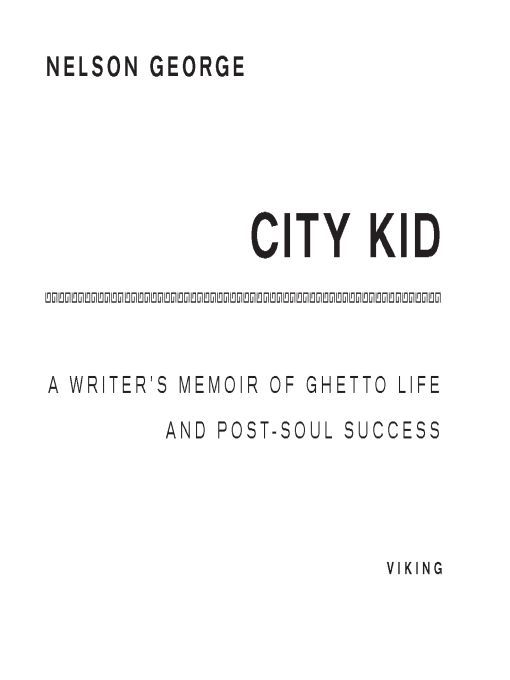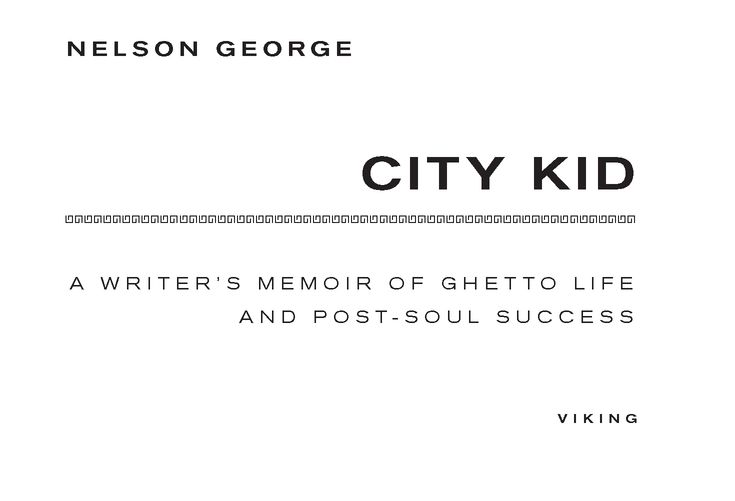City Kid


Table of Contents
Â

ALSO BY NELSON GEORGE
NONFICTION
Post-Soul Nation
Hip Hop America
Buppies, B-boys, Baps, & Bohos
Blackface
Elevating the Game
The Death of Rhythm & Blues
Where Did Our Love Go?
Hip Hop America
Buppies, B-boys, Baps, & Bohos
Blackface
Elevating the Game
The Death of Rhythm & Blues
Where Did Our Love Go?
Â
WITH RUSSELL SIMMONS
Life and Def
Â
FICTION
The Accidental Hunter
Night Work
Show & Tell
One Woman Short
Seduced
Urban Romance
Night Work
Show & Tell
One Woman Short
Seduced
Urban Romance

VIKING
Â
Published by the Penguin Group
Penguin Group (USA) Inc., 375 Hudson Street, New York, New York 10014, U.S.A. ⢠Penguin Group (Canada), 90 Eglinton Avenue East, Suite 700, Toronto, Ontario, Canada M4P 2Y3 (a division of Pearson Penguin Canada Inc.) ⢠Penguin Books Ltd, 80 Strand, London WC2R 0RL, England ⢠Penguin Ireland, 25 St. Stephen's Green, Dublin 2, Ireland (a division of Penguin Books Ltd) ⢠Penguin Books Australia Ltd, 250 Camberwell Road, Camberwell, Victoria 3124, Australia (a division of Pearson Australia Group Pty Ltd) ⢠Penguin Books India Pvt Ltd, 11 Community Centre, Panchsheel Park, New Delhi - 110 017, India ⢠Penguin Group (NZ), 67 Apollo Drive, Rosedale, North Shore 0632, New Zealand (a division of Pearson New Zealand Ltd) ⢠Penguin Books (South Africa) (Pty) Ltd, 24 Sturdee Avenue, Rosebank, Johannesburg 2196, South Africa
Â
Penguin Books Ltd, Registered Offices: 80 Strand, London WC2R 0RL, England
Â
First published in 2009 by Viking Penguin, a member of Penguin Group (USA) Inc.
Â
Copyright © Nelson George, 2009
All rights reserved
Â
PHOTOGRAPH CREDITS
Insert page 7 (top): Photo Chuck Pulin
Insert page 10: © Chase Roe
Insert page 12 (top): © David Lee 2008
Insert page 13 (bottom): © suekwon
Other insert photographs courtesy of Nelson George
Insert page 7 (top): Photo Chuck Pulin
Insert page 10: © Chase Roe
Insert page 12 (top): © David Lee 2008
Insert page 13 (bottom): © suekwon
Other insert photographs courtesy of Nelson George
Â
LIBRARY OF CONGRESS CATALOGING IN PUBLICATION DATA
Â
George, Nelson.
City kid : a writer's memoir of ghetto life and post-soul success / by Nelson George.
p. cm.
eISBN : 978-1-101-02240-5
1. George, Nelson. 2. Music criticsâUnited StatesâBiography. 3. Authors, Americanâ20th centuryâBiography. I. Title.
ML423.G317A3 2009
781.64092âdc22
[B] 2008027422
Â
Â
Without limiting the rights under copyright reserved above, no part of this publication may be reproduced, stored in or introduced into a retrieval system, or transmitted, in any form or by any means (electronic, mechanical, photocopying, recording or otherwise), without the prior written permission of both the copyright owner and the above publisher of this book.
Â
The scanning, uploading, and distribution of this book via the Internet or via any other means without the permission of the publisher is illegal and punishable by law. Please purchase only authorized electronic editions and do not participate in or encourage electronic piracy of copyrightable materials. Your support of the author's rights is appreciated.
DEDICATED TO MY FAMILY, FOR THE LOVE AND THE LESSONS
Between 1950 and 1957 alone, Brooklyn lost a total of 135,000 men,
women, and children. They were buying the blarney about the suburbs,
they were buying cars, they were moving out to the sticks.
Filling the housing vacuum they left behind, 100,000 newcomers
moved in, many of them black and Puerto Rican, many also seeking
a better tomorrow, as their predecessors had. Another wave of
resettlement for Brooklyn.
women, and children. They were buying the blarney about the suburbs,
they were buying cars, they were moving out to the sticks.
Filling the housing vacuum they left behind, 100,000 newcomers
moved in, many of them black and Puerto Rican, many also seeking
a better tomorrow, as their predecessors had. Another wave of
resettlement for Brooklyn.
âElliot Willenski,
When Brooklyn Was the World: 1920-1957
When Brooklyn Was the World: 1920-1957
INTRODUCTION
This book is called
City Kid
because, well, quite honestly I couldn't survive in the suburbs or the country. I don't drive. Malls give me hives, and I've never dined in a Denny's and don't wanna start now. This book contains few descriptions of rolling hills, limpid pools of water, or clear blue skies. There is, however, much talk of playground games, nightclubs, and boundless ambition.
City Kid
because, well, quite honestly I couldn't survive in the suburbs or the country. I don't drive. Malls give me hives, and I've never dined in a Denny's and don't wanna start now. This book contains few descriptions of rolling hills, limpid pools of water, or clear blue skies. There is, however, much talk of playground games, nightclubs, and boundless ambition.
Almost the entire book takes place in four of New York's boroughs, with the exception of a chapter in Detroit, two in Los Angeles, and two in the Tidewater area of Virginia. I could have slipped in chapters set in my other favorite cities (London, Paris, Amsterdam), but this book is about how family and art intersect, and the most important connecting points for me are the concrete jungles of America.
Peace.
HOW I CAME TO BE
Like most black Americans, I have only a fleeting understanding of my family's history. I know nothing of my African ancestors, but, thanks to the diligence of a few relatives, I do know a few things about my American ones. My two family trees were rooted in Virginia and North Carolina during the Civil War era. At some point during the early 1860s, in the small town of Bracey, Virginia, just north of North Carolina, Willie Butcher, a black man, met a white woman named Pinkey George. Miscegenation was much more common in this country, and in the South in particular, than our official histories let on. Yet a real romantic relationship between a black man and a white woman in that part of the country at that time makes me think Willie and Pinkey were crazy in love.
This union produced one son, Thomas George, born in 1862. Thomas, who married Harriet Boyd, born June 1, 1864, toiled on the Boyd plantation. Harriet's father, a houseboy on that same plantation, was named Nelson Boyd, and Harriet gave his name to one of their six children, my grandfather Nelson Sterling George.
Nelson Sterling, born January 15, 1892, was a short, fair-skinned man with sharp, piercing eyes, curly hair, and facial features that suggested that Willie Butcher had some Native American blood coursing through his veins. In photographs Nelson Sterling is always very well dressed in nicely tailored suits that were often augmented by a straw hat. Older members of the George family recall that he was quite a storyteller, and that on some Sunday evenings down in Bracey he'd gather up the children and tell ghost stories. My mother says he was a very graceful, handsome man who grayed early, which only enhanced his looks.
My own memories of Nelson Sterling are fleeting. He died in October 1960, when I was just three years old. I remember a gray-haired man in a suit picking me up and holding me up in the air on a trip to Virginia. It must have been in September of that year, since the family held a birthday party in Grandpa's backyard. I was the first George grandchild, and I was named after him, which must have been a great source of pride. My grandmother, Matdora, aka Mattie Clary, was nearly a foot taller than her husband, and about fifteen years younger, and she had a stern demeanor that was reflected in her omnipresent frown. Matdora would outlive her husband by some thirty-six years, and would be a strong, though not always warm, presence in my life.
What I do know of Nelson Sterling and Matdora's life was that the early years were rough. They lived in a little two-room shack down in Bracey, and, as their family expanded to seven kids, some of them would be sent off for a time to live with other relatives, to ease the financial burden. Later most of their offspring ended up relocating to New York and Chicago. In the 1950s, Nelson Sterling and Matdora relocated to Newport News, Virginia, where a massive shipbuilding and dry-dock company, and the naval base it supported, became an employment hub. The Newport News shipyard, which for decades was the world's largest, was built by Collis P. Huntington, who'd been the driving force behind the first transcontinental railroad. About his Virginia operation Huntington once said, “We shall build good ships here. At a profitâif we can. At a lossâif we must. But always good ships.” From World War II through the Korean War, the shipyard boomed, creating hundreds of jobs that, despite the limitations of Southern Jim Crow laws, ended up feeding scores of black families. Because of the shipyard Newport News became a place where a man of African descent could earn an honest wage, buy a house, and have some self-respect. In the cradle of the Confederacy, Newport News was something of a safe haven for black aspirations.
The Georges moved into a big, three-bedroom home, with a piano she loved to play and a big garden where she grew fruit for preserves and gathered the vegetables for her massive Sunday feasts. But all was not smooth in the household of Nelson Sterling and Mattie. He had a childâa girlâoutside the marriage, and not with just any woman, but with one of his wife's sisters. While her children eventually came to accept this unexpected sibling, my grandmother was, not surprisingly, reluctant to do so.
When my mother started dating Nelson Elmer, his father, a World War I veteran, was spending most of the week living at a Veterans Administration hospital, where he'd receive treatment for his diabetes, and then come home on the weekends. It seemed an unusual arrangement, and strikes me even more so now (perhaps fallout from his out-of-wedlock “marriage”?).
My father, Nelson Elmer, was in the middle of Matdora's pack and, like his daddy, was on the short side, and had a gift for gab and a persuasive charm. He and his older brother, James, both served in Korea. When Nelson Elmer came back from Korea in the mid-1950s, he began wooing a cutie who didn't live too far away from the George residence. The girl's nickname was Doll.
Arizona Bacchus's family saga goes back to a North Carolina clan known as Brothers. As far as family historians know, there were nine Brothers children, but only one was a boyâWillieâwho kept the name alive, as all the girls took on the names of their husbands. My great-grandmother was named Celia Bacchus, which I've been told was the name of a plantation owner of Greek heritage in North Carolina, but that may just be speculation. Celia had three sons, one of whom, Daniel Bacchus, was my grandfather. Daniel was dark, stocky, and muscular, and, when he was young, had long, thick hair that suggested his family had Native American blood as well. In 1929, at age twenty-nine, my great-grandmother Celia moved with her boys to Newport News. I don't know if she was married or not, but I'm assuming not, as no man's name has surfaced.
Other books
Somersault by Kenzaburo Oe
Hardy 05 - Mercy Rule, The by John Lescroart
Angel City by Jon Steele
Who Am I Without Him? by Sharon Flake
Running the Rift by Naomi Benaron
Ghosts of Rosewood Asylum by Prosapio, Stephen
The Strength of Three by Annmarie McKenna
Talker 25 by McCune, Joshua
Written on Silk by Linda Lee Chaikin
Detonator by Andy McNab